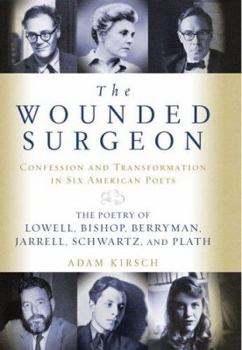The Wounded Surgeon: Confession and Transformation in Six American Poets: The Poetry of Lowell, Bishop, Berryman, Jarrell, Schwartz, and Pl
Select Format
Select Condition 
Book Overview
Robert Lowell, Elizabeth Bishop, Sylvia Plath, John Berryman, Randall Jarrell, and Delmore Schwartz formed one of the great constellations of talent in American literature. In the decades after World War II, they changed American poetry forever by putting themselves at risk in their poems in a new and provocative way. Their daring work helped to inspire the popular style of poetry now known as "confessional." But partly as a result of their openness,...
Format:Hardcover
Language:English
ISBN:0393051978
ISBN13:9780393051971
Release Date:May 2005
Publisher:W. W. Norton & Company
Length:256 Pages
Weight:1.00 lbs.
Dimensions:1.1" x 5.8" x 8.5"
Customer Reviews
3 ratings
The Surgeon's Gift: Inspiration and Clarity
Published by Thriftbooks.com User , 18 years ago
Adam Kirsch takes his title "The Wounded Surgeon" from T. S. Eliot's poem "East Coker": "The wounded surgeon plies the steel That questions the distempered part." In his introduction, Kirsch explains: "T.S. image evokes the resolve, not to say heroism, that these poets displayed by submitting their most intimate and painful experiences to the objective discipline of art. . . . But the suffering that afflicted this group of poets becomes significant only because they examined it with the surgeon's rigor, detachment, and skill" (p. xi). Kirsch does the same--examines with "rigor, detachment and skill"--the body of these six poets' lives and works. His close readings deepen our understanding of how their lives and work intertwined, influenced, and yes, (as the subtitle says) transformed each other. Lowell, Bishop, Berryman, Jarrell, Schwartz, and Plath never had a better reader--certainly not in one place. Each chapter illumines the other as Kirsch patiently explores his thesis and shows the rise and (and in the case of Schwartz) the fall of their talents. Kirch shows their education and work in the context of the literary movements of the time--modernism and The New Criticism. These six poets scrambled a path through Moderism to a new form of poetic expression that would stamp itself on generations of poets to come. This new way of writing allowed the breath and messiness of life to come inside the poem, not be held aloof and at bay outside. Personally, I especially enjoyed his chapter on Elizabeth Bishop ("Everything only connected by 'and'and 'and'") as Kirch elucidates Bishop's search to "contain loss in art, the scream in the clang." I came away with a profound appreciation of Bishop as craftsperson (maker), poet, person, and woman...and, can now take these insights back to reading her work. I also found inspiration and greater clarity for my own work from reading this book. What greater gift can a writer ask? --Janet Grace Riehl,Sightlines: A Poet's Diary
Not a poet or critic
Published by Thriftbooks.com User , 19 years ago
I have little to no experience with poetry criticism and little appreciation for modern poetry. I was hoping this book would provide me with some education so I could appreciate poetry to a greater extent. Well, it did that and more. I found the book very interesting. Although a "dense" read (I read many sections more than once to understand them), I found it worth my time. I came away with an understanding of these poets and how to read their, and others', poetry. I found the analyses to be straightforward and not full of a lot of insider jargon. Although I have no sense of how much the author's comments are revisionist, repetitive of prior work, or new; I found them to be well-substantiated and supported by some wonderful examples of poems.
Poetic Purging
Published by Thriftbooks.com User , 19 years ago
Adam Kirsch has written an interesting 'surgical procedure' in the THE WOUNDED SURGEON: he defends the so-called 'Confessional Poets' Robert Lowell, Elizabeth Bishop, Sylvia Plath, John Berryman, Randall Jarrell, and Delmore Schwartz whose work from 1940 through the 1970s, praising "the resolve, not to say heroism, that these poets displayed by submitting their most intimate and painful experiences to the objective discipline of art." In clear and at all times illuminating prose Kirsch examines each of these six poets and relates the personal lives that influenced their major works. Not a gossip column this, but an erudite exploration of how pain and death and disappointment and tragedy of all manner drove these poets to validate their own sorrows and rage rather that imagining those feelings or assigning them to fictitious personages. While most everyone knows the life and times and resulting poetry of Sylvia Plath (endless biographies and films have seen to that), few of the others' lives are understood. Kirsch sets the record straight and in doing so makes lucid some of the more obtuse works included in this book. Some would argue that Kirsch's thesis goes on too long, but in getting into the minds and hearts of poets can be a lengthy process. Kirsch has done a fine job of study on these six poets and lets us see how their art transformed their lives by their confessional poetry. Grady Harp, June 05






